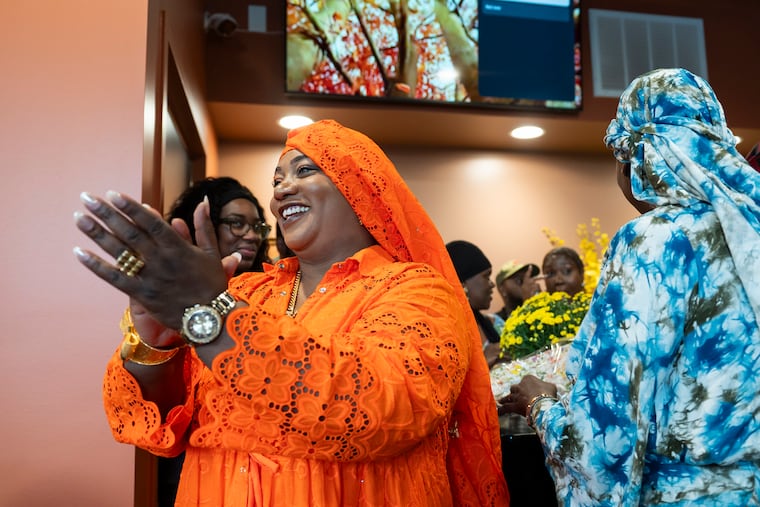West African restaurant Kilimandjaro’s long-awaited comeback is also a celebration of its owner, Youma Ba
Four years after Kilimandjaro closed to make way for a new building, it's back in University City. With drums, speeches, and Jollof rice, Youma Ba's friends and associates paid tribute.

Thursday’s ribbon-cutting of Kilimandjaro restaurant in University City was equal parts celebration of a community hub and tribute to its owner, Youma Ba.
Speaker after speaker — city officials and representatives of West African nations, including Ba’s native Senegal — packed the dining room to praise her generosity (“she never turns away a hungry person”) and her tenacity (“I remember when we weren’t exactly sure how this was going to turn out”). A presidential lifetime achievement award from U.S. Rep. Dwight Evans (D., Pa.) was read aloud, commending Ba for contributing more than 4,000 hours of community service. While drummers pounded beats and a musician strummed a kora, Ba’s staff brought out platters of kebabs, Jollof rice, plantains, and beignets, and served cups of ginger juice.
The party, in fact, marked Kilimandjaro’s reopening — four years and a few hundred feet from its original site in what was then the strip center on the 4300 block of Chestnut Street in which Ba opened the restaurant in 2005.
Fifteen years later, Kilimandjaro was forced to close. Her longtime landlord, Bob Racciatti, who was among Thursday’s speakers lauding Ba, had sold the strip mall. The new owner, Alterra Property Group, razed the center but assured Ba that when the property was redeveloped, there would be room for Kilimandjaro. “Including her was a no-brainer,’ said Jared Kern, Alterra’s director of development, a plate of food in front of him. “We are thrilled to have her continue her legacy.”
Four years later, the new Kilimandjaro, which has about 60 seats and is open daily from lunchtime to late night, occupies the 44th and Chestnut Street corner of LVL West, as the new block-long building is known. LVL West includes 275 apartments and a roof deck, exercise center, and dog park. Next door is a Grocery Outlet supermarket.
The pandemic was not easy for Ba, who worked out of her 10-seat restaurant, Youma, a mile away, which is currently closed for renovations. “People come, hang out, sit down, and eat there,” Ba said. “It’s not the same experience. Most of the time people eat African food and want to come have the experience, and the food.”
Ba, 49, grew up in Dakar, in a big Fulani family of 12 children, the oldest of nine girls. “At a young age, we have to cook because this is the way it is,” Ba said. “Every girl had to learn how to cook because we don’t know when we’re getting married. It was something we learn early.”
Ba studied economics in a university, but after graduation said she struggled, “trying to get my life together as a young woman,” she said. In 1999, at age 24 in 1999, she immigrated to the United States, speaking French, Wolof, a bit of Mandingo, but no English. “I thought there would be opportunities,” she said. “I thought, ‘Let me try.’”
She got a job waiting tables in a New York City restaurant and later segued into the kitchen — “I can cook [only] what I know,” she said.
When her boss opened La Calebasse on Baltimore Avenue in West Philadelphia’s Spruce Hill neighborhood in 2002, Ba moved to Philadelphia.
In 2005, she left La Calebasse to open Kilimandjaro — the “d” reflects the French spelling, Ba said. (Asked why a West African restaurant would be named after a mountain in Tanzania, clear across the continent, Ba said: “It’s the highest mountain in all of Africa. I was looking for something that defines all of us.”)
When Le Calebasse closed in 2016, Ba took over its location for her second restaurant and named it Youma. That restaurant will be closed for several months as Ba gets the expansive new Kilimandjaro up and running.
Youma means “mother” in her native Fula, and Ba wears the name proudly. You can see it in the way that she directs her young staff with hugs and encouragement — and firmness. To Ba’s younger sister Coumba, Kilimandjaro’s general manager, “she’s like a sister and a mom.”
“She pushes me and that’s why I succeed,” said Ba’s daughter, Veronique, a 16-year-old junior at Central High School. Veronique’s father, retired Philadelphia Police Officer Michael Brinkley, died suddenly in 2012 when she was 4.
Ba credits her own success to Veronique. “She pushes me,” she said. “I have to be very strong for her. She reminds me of everything that’s right: She’s strong. She’s helpful. I want her to understand that we are working very hard to have a better life.”
As a woman leader in the restaurant business, Ba said, “it’s very tough, especially when you’re working with the African community. You know, we are not raised to get a woman leadership. It’s hard for most men to see a woman dictating what to do, and it’s difficult to work with women sometimes because they’re not used to woman leadership. But at the end of the day, we become family. You just have to explain to them: ‘This is not between boss and employee. This is between two sisters or brother and sister who work together.’ I was just an employee like you guys. Tomorrow, you can be the boss just like me.”
“This is life. We all have to go somewhere and start somewhere.”